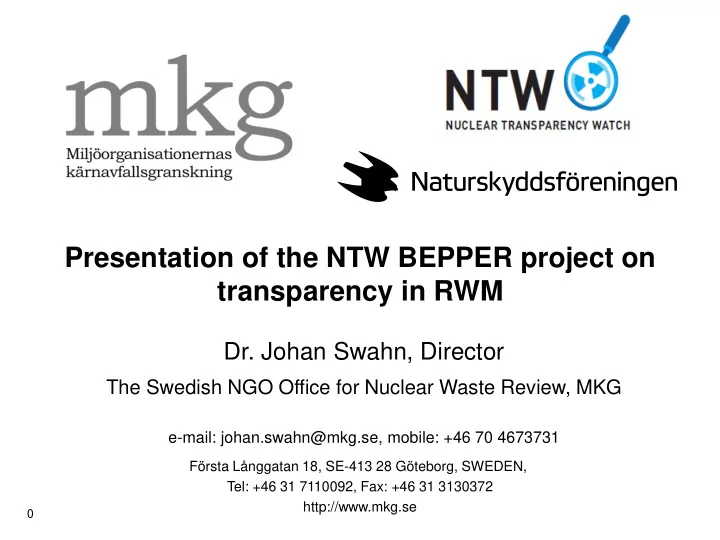

Presentation of the NTW BEPPER project on transparency in RWM Dr. Johan Swahn, Director The Swedish NGO Office for Nuclear Waste Review, MKG e-mail: johan.swahn@mkg.se, mobile: +46 70 4673731 Första Långgatan 18, SE-413 28 Göteborg, SWEDEN, Tel: +46 31 7110092, Fax: +46 31 3130372 http://www.mkg.se 0 Johan Swahn, The Swedish NGO Office for Nuclear Waste Review, MKG
Importance of nuclear transparency (public information and participation) • Better engagement of civil society • Improved quality of decision-making processes • Higher safety of implemented management and disposal • Better chances for progress towards implementation of projects with: – Early initialisation of public participation – The input is seriously taken due account of – A real possibility to influence decision-making including legislation to allow access to justice – Importance of availability of enduring resources for participation (local communities and NGOs) 1 Johan Swahn, The Swedish NGO Office for Nuclear Waste Review, MKG
Aarhus Convention • The “Convention on Access to Information, Public Participation in Decision-making and Access to Justice in Environmental Matters” was adopted within UNECE in Aarhus in 1998 and entered into force in 2001. All EU countries and the European Union (except Euratom) are parties and are implementing the convention on national and EU levels. • Three pillars: 1. Access to information 2. Access to public participation in decision-making 3. Access to justice • Euratom is not a party to the convention 2 Johan Swahn, The Swedish NGO Office for Nuclear Waste Review, MKG
EU Radioactive Waste Directive • 2011 European Union Radioactive Waste Directive (Council Directive 2011/70/EURATOM) “establishing a Community framework for the responsible and safe management of spent fuel and radioactive waste”. • First “National Programme ” and report were submitted by the European Union member states to the European Commission in late August 2015 • Article 10 of the directive is on “Transparency” • “necessary information” • “necessary opportunities to participate effectively” • Both: “in accordance with national legislation and international obligations” = Aarhus Convention 3 Johan Swahn, The Swedish NGO Office for Nuclear Waste Review, MKG
The BEPPER report • The NTW BEPPER project was started in 2014 • BEPPER = “Broad Framework for Effective Public Information and Participation in Environmental Decision- making in Radioactive Waste Management” • BEPPER report in December 2015 • http://www.nuclear- transparency-watch.eu/a-la- une/new-publication-bepper- report.html Johan Swahn, The Swedish NGO Office for Nuclear Waste Review, MKG
The BEPPER report • The NTW BEPPER team: – Johan Swahn (MKG) – Philip Kearney (NTW and CiviQ) – Nadja Železnik (REC) – Vanessa Liston (CiviQ ) – Gilles Heriard-Dubreuil (Mutadis) – Jan Haverkamp (NTW) – Patricia Lorenz (NTW) • The NTW BEPPER network – 29 NGOs from 16 countries • The NTW office (Marie-Alix Verhoeven) Johan Swahn, The Swedish NGO Office for Nuclear Waste Review, MKG
The BEPPER report • The concept of transparency in relation to radioactive waste management (RWM) • Transparency as defined in the Radioactive Waste Directive • Transparency using the Aarhus Convention as a basis • Effective transparency: “The NTW BEPPER Pillars for Effective Transparency” – Effective access to information and communication – Effective access to public participation and consultation – Effective access to justice and decision-making – Effective access to resources • Towards more innovative transparency processes: from consultation to deliberation • Development of “key components” and a “level system” (Appendixes: Relevant research and experience + International end European governance Johan Swahn, The Swedish NGO Office for Nuclear Waste Review, MKG
The BEPPER report • NTW BEPPER key components • From the enquiries and analysis undertaken by the project team a set of key components for effective transparency in RWM have been collated. They have been influenced by and correlated with the inputs from the NGOs, experts and civil society representatives. They are categorised into Principles, Practice, Resources and Innovation. • NTW BEPPER levels • The NTW BEPPER level system can be characterised as a tool for evaluating transparency in RWM. For each of the four NTW BEPPER pillars a number of levels of implementation have been identified where higher levels correspond to more advanced implementation. The levels thus reflect degrees of effective implementation in the domain of transparency in RWM. Johan Swahn, The Swedish NGO Office for Nuclear Waste Review, MKG
Moving forward • NTW works for transparency in the development of Member State reports and national programmes according to the Radioactive Waste Directive • NTW works for the transparency of the European Commission in RWM issues Publication of the first reorts and national programmes on the NTW web site (http://www.nuclear-transparency-watch.eu/a-la-une/access- to-national-programmes-on-radioactive-waste- management.html) • Potential to use the NTW BEPPER levels for evaluation of transparency governance in Member States Johan Swahn, The Swedish NGO Office for Nuclear Waste Review, MKG
Dr. Johan Swahn, Director The Swedish NGO Office for Nuclear Waste Review, MKG e-mail: johan.swahn@mkg.se, mobile: +46 70 4673731 http://www.mkg.se 9 Johan Swahn, The Swedish NGO Office for Nuclear Waste Review, MKG
Recommend
More recommend